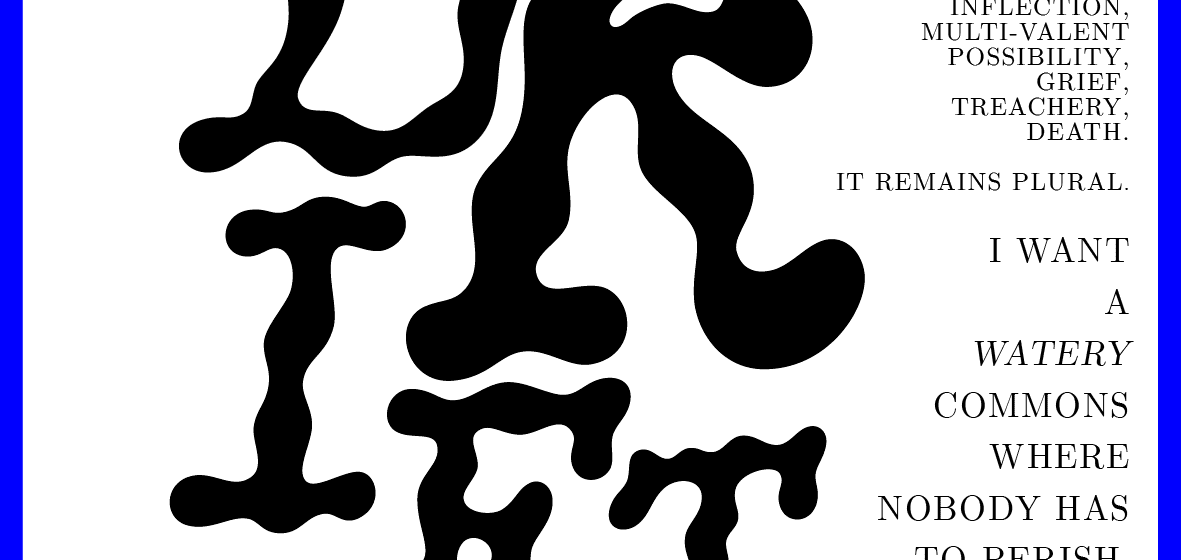-
Location
NERO
Lungotevere degli artigiani 8/b
00153 Rome
Italy
-
Date
17 to 19 November 2022
-
SVP
To participate, send an email to theeuropeanpavilion@culturalfoundation.eu
- Artists
As part of programme of The European Pavilion in Rome, iniva is proposing three reading sessions organised from 17 to 19 November 2022, in collaboration with and hosted by NERO.
The sessions bring together some of our Archipelagos in Reverse Research Network Associates, who have been involved in iniva’s DRIFT pavilion project through their contribution to a special issue of STUART papers, thinking through fluidity of notions of nationhood.
During the sessions, participants will be invited to discuss ideas and texts taking inspiration from the texts written by contributors Rohan Ayinde, Kaitlene Koranteng, Rose Nordin, Sepake Angiama, Rahila Haque, Lola Olufemi, Cairo Clarke, and Adjoa Armah.
No prior reading is required to participate in the session: we will read all the texts together.
PROGRAMME
This session weaves together questions of migration and movement in relation to sound and water with curator and writer. Thinking about sound as movement and how water connects to departures and arrivals. Writer and artist leads readings to consider what it means to belong to a diaspora? How can you create space for yourself in spaces where you are othered? And what does it mean to have the archipelagic as a part of your practice?Feminist writer proposes to address the topic of imagination and borderlessness through questions such as: How do you unbuild a nation? Who gets to imagine borderlessness and how multiple imaginaries of nations can coexist?
ABOUT THE ARTISTS
Adjoa Armah is an artist, educator, writer and editor with a background in design anthropology. Her practice is concerned with narrative, the archive, pedagogy, black ontology and spatial consciousness. She is founder of Saman Archive, a gathering of photographic negatives encountered across Ghana, through which she explores new models of institution building grounded in Akan temporalities and West African technologies of social and historical mediation. She is editor and research fellow at Afterall, where she is responsible for the Paul Mellon Centre-funded digital research project ‘Black Atlantic Museum’ and the ‘Afterall Art School’, platform. Armah is also a practice-led DPhil researcher in Fine Art at Ruskin School of Art at the University of Oxford with a project provisionally titled; ‘Meeting Saman: On Study with Narrative posture and -graphy in/as Archival Methodology’. She has been published widely, including in Afterall, e-flux, Frieze, A Magazine Curated by, Apartamento, Vogue and TSA Art Magazine. She has taught across art, curating, design, spatial practices, and writing programmes at institutions including Ruskin School of Art, Central Saint Martins, University of Westminster, Royal College of Art, and HEAD, Geneva University of Art and Design. Armah holds an MA in Material Anthropology and Design from University College London
Cairo Clarke is a curator and writer based in London and Napoli. Her work is informed by slowness, it centres forms of knowledge production and dissemination that slip between the cracks, are formed on unstable ground and take on multiple temporalities. Supporting strands of theorising taking place in autonomous spaces and holding space for the mess.
Sepake Angiama praxis stems from radical pedagogies, black feminist thought, rethinking human/non–human relations rooted in how we might reimagine and inhabit the world otherwise. She is the artistic director of the Institute of International Visual Arts (iniva), dedicated to developing artistic research, radial education practices, collective study, publishing and community led commissioning that reflects on the social and political impact of globalisation.
Lola Olufemi is a Black feminist writer and CREAM/Stuart Hall Foundation researcher who works and organises in London. Her work focuses on the uses of the feminist imagination and its relationship to cultural production, political demands and futurity. Adjoa Armah is an artist, writer, curator, and educator with a background in material anthropology and design. Based between London and Accra, her practice is concerned with the entanglement between narrative form, archival practice, mapping and spatial consciousness, pedagogy, Black ontology, ethnology, and the political.
ABOUT STUART PAPERS
Conceived and designed by Rose Nordin, STUART is a publishing platform initiated in 2021, documenting thoughts from researchers, writers and visual
artists through collaborations that reflects thematically on selected texts and archived ephemera from the Stuart Hall Library. The papers seek to work through Live Archiving of thought and hosts unfinished or personal reflections amidst quotes, notes and marginalia of ancestral whispers; from the thinkers that unite our work and thinking.
ABOUT THE EUROPEAN PAVILION
The European Pavilion is a programme by the European Cultural Foundation that provides spaces for experimentation and reflection on Europe. Every two years, together with foundation partners, the European Cultural Foundation supports cultural organisations across Europe that are developing new artistic programmes and commissions offering fresh perspectives on Europe and imagining our shared future. All projects are then presented on the occasion of a major art event, which is happening this year in Rome across seven different venues.
Over the course of three days, artists, thinkers and researchers from across the continent come together in programme that offers panel discussions, talks and workshops, music performances, a virtual reality environment, as well as sculptural and multimedia installations. Discover the full programme here.
The European Pavilion in Rome is organised in collaboration with Fondazione Studio Rizoma, and hosted by partners Bibliotheca Hertziana –Max Planck Institute for Art History, Goethe–Institut Rome, German Academy Rome Villa Massimo, Académie de France à Rome Villa Médicis, Istituto Svizzero (Swiss Institute), Museo delle Civiltà, and NERO.
